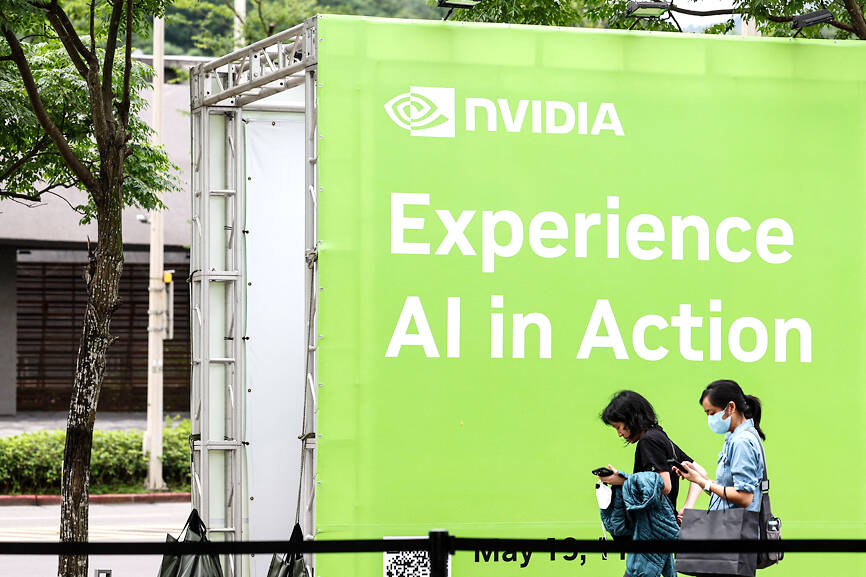China raised concerns over potential security risks in Nvidia Corp’s H20 artificial intelligence (AI) chip, casting uncertainty over the company’s sales prospects in China weeks after a US export ban was reversed.
The Cyberspace Administration of China, the country’s Internet regulator, said it was concerned by a US proposal for advanced chips sold abroad to be equipped with tracking and positioning functions.
It said it had summoned Nvidia to a meeting yesterday to explain whether its H20 AI chip had any backdoor security risks, as it was worried that Chinese user data and privacy rights could be affected.

Photo: I-Hwa Cheng, AFP
Nvidia did not immediately respond to a request for comment.
US Senator Tom Cotton in May introduced a bill that would direct the US Department of Commerce to require location verification mechanisms for AI chips subject to export restrictions to curb Chinese access to advanced US semiconductor technology.
Nvidia has been in the crosshairs of US-China relations and Beijing’s move comes shortly after Washington this month reversed an April ban on Nvidia selling the H20 chip to China.
The company developed the H20 chip for the Chinese market after the US imposed export restrictions on advanced AI chips in late 2023.
“Nvidia chips are now dispensable for China. They can be easily put on the negotiating table,” Gavekal Dragonomics (龍洲經訊) analyst Tilly Zhang (張婷婷) said. “China obviously has more courage and domestic substitution capabilities compared to previous years to not rely on overseas technology.”
Nvidia CEO Jensen Huang (黃仁勳) this month embarked on a very public and effusive visit to China, where he sought to demonstrate his commitment to the Chinese market, met with government officials and praised the country’s AI advances.
The cyberspace administration’s statement did not elaborate on what backdoor security risks there could be or say what the Chinese government was considering to do as a result.
86Research Ltd (八六證券研究) analyst Charlie Chai (柴超毅) said Beijing’s warning was most likely a symbolic stance against similar objections made by US authorities.
“However, we do not believe Beijing will make excessively harsh demands or introduce regulatory hurdles that will effectively drive Nvidia out of China — for the lack of alternatives, China still needs Nvidia chips for domestic research and applications,” Chai said.
Nvidia’s products are highly sought after not just by Chinese tech companies, but also by Chinese military bodies, state-run AI research institutes and universities.
The company last week placed an order with contract chipmaker Taiwan Semiconductor Manufacturing Co (台積電) for 300,000 H20 chipsets due to strong demand, Reuters reported.
Nvidia is also facing an antitrust investigation in China. The State Administration for Market Regulation announced late last year it was investigating the chipmaker over suspected contraventions of the country’s anti-monopoly law.
The regulator said Nvidia was also suspected of contravening commitments it made during its acquisition of Israeli chip designer Mellanox Technologies Ltd, under terms outlined in the regulator’s 2020 conditional approval of that deal.

GROWING OWINGS: While Luxembourg and China swapped the top three spots, the US continued to be the largest exposure for Taiwan for the 41st consecutive quarter The US remained the largest debtor nation to Taiwan’s banking sector for the 41st consecutive quarter at the end of September, after local banks’ exposure to the US market rose more than 2 percent from three months earlier, the central bank said. Exposure to the US increased to US$198.896 billion, up US$4.026 billion, or 2.07 percent, from US$194.87 billion in the previous quarter, data released by the central bank showed on Friday. Of the increase, about US$1.4 billion came from banks’ investments in securitized products and interbank loans in the US, while another US$2.6 billion stemmed from trust assets, including mutual funds,

Micron Memory Taiwan Co (台灣美光), a subsidiary of US memorychip maker Micron Technology Inc, has been granted a NT$4.7 billion (US$149.5 million) subsidy under the Ministry of Economic Affairs A+ Corporate Innovation and R&D Enhancement program, the ministry said yesterday. The US memorychip maker’s program aims to back the development of high-performance and high-bandwidth memory chips with a total budget of NT$11.75 billion, the ministry said. Aside from the government funding, Micron is to inject the remaining investment of NT$7.06 billion as the company applied to participate the government’s Global Innovation Partnership Program to deepen technology cooperation, a ministry official told the

Taiwan Semiconductor Manufacturing Co (TSMC, 台積電), the world’s leading advanced chipmaker, officially began volume production of its 2-nanometer chips in the fourth quarter of this year, according to a recent update on the company’s Web site. The low-key announcement confirms that TSMC, the go-to chipmaker for artificial intelligence (AI) hardware providers Nvidia Corp and iPhone maker Apple Inc, met its original roadmap for the next-generation technology. Production is currently centered at Fab 22 in Kaohsiung, utilizing the company’s first-generation nanosheet transistor technology. The new architecture achieves “full-node strides in performance and power consumption,” TSMC said. The company described the 2nm process as

Even as the US is embarked on a bitter rivalry with China over the deployment of artificial intelligence (AI), Chinese technology is quietly making inroads into the US market. Despite considerable geopolitical tensions, Chinese open-source AI models are winning over a growing number of programmers and companies in the US. These are different from the closed generative AI models that have become household names — ChatGPT-maker OpenAI or Google’s Gemini — whose inner workings are fiercely protected. In contrast, “open” models offered by many Chinese rivals, from Alibaba (阿里巴巴) to DeepSeek (深度求索), allow programmers to customize parts of the software to suit their